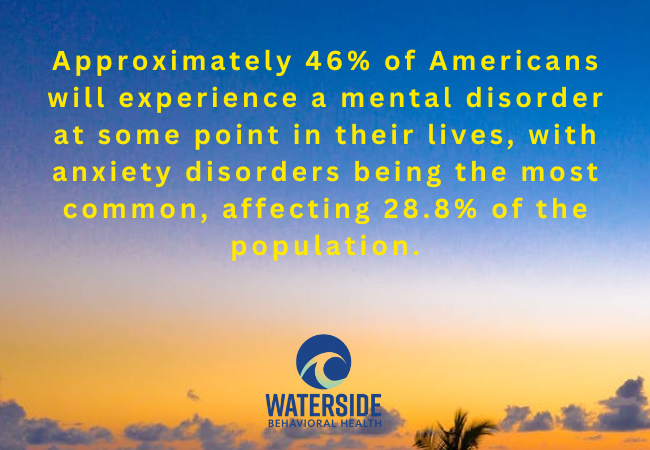Anxiety is a natural response to stress, but when it becomes persistent, excessive, and disrupts daily life, it may develop into an anxiety disorder. Millions of individuals in the United States struggle with anxiety, making it one of the most common mental health conditions today. While some people manage their symptoms with natural remedies, others require clinical treatments for effective relief.
At Waterside Behavioral Health, we specialize in anxiety treatment in Massachusetts, providing a blend of natural and clinical approaches to help individuals find lasting relief. Our mental health treatment center in Massachusetts offers Cognitive-Behavioral Therapy in Massachusetts, Dialectical Behavior Therapy in Massachusetts, and Trauma Therapy in Massachusetts to support individuals in overcoming anxiety.
This article explores the effectiveness of natural remedies vs. clinical treatments, helping individuals determine the best approach for managing anxiety.
Understanding Anxiety: What Causes It?
Anxiety is influenced by a combination of biological, psychological, and environmental factors. Identifying the root cause of anxiety is crucial for selecting the right treatment approach.
1. Genetic and Biological Factors
- Individuals with a family history of anxiety disorders may have a higher risk of developing anxiety.
- Neurotransmitter imbalances, particularly with serotonin, dopamine, and gamma-aminobutyric acid (GABA), contribute to increased anxiety.
2. Stress and Trauma
- Major life changes, high-stress environments, and traumatic experiences can trigger anxiety disorders.
- Unresolved trauma, especially from childhood, is often linked to Post-Traumatic Stress Disorder (PTSD), which requires trauma therapy in Massachusetts for recovery.
3. Medical and Lifestyle Factors
- Chronic illnesses such as thyroid disorders and heart conditions can exacerbate anxiety.
- Substance use, excessive caffeine consumption, and poor sleep hygiene can worsen symptoms.
Natural Remedies for Anxiety: Do They Work?
Many individuals prefer natural remedies as a first-line approach to managing anxiety, particularly those who want to avoid medication. While these remedies can be helpful, their effectiveness varies based on the severity of symptoms.
1. Mindfulness and Meditation
Practicing mindfulness allows individuals to stay present, reducing excessive worrying about the past or future. Meditation helps regulate emotions and improve stress resilience.
Benefits:
- Enhances emotional regulation and reduces cortisol (stress hormone) levels.
- Improves focus and reduces racing thoughts.
Limitations:
- May not provide sufficient relief for severe anxiety disorders.
- Requires consistent daily practice to see long-term benefits.
2. Exercise and Physical Activity
Regular exercise releases endorphins, which are natural mood boosters that help reduce anxiety symptoms. Activities such as yoga, jogging, and strength training significantly improve mental health.
Benefits:
- Lowers stress hormone levels and improves overall mood.
- Enhances sleep quality, which is crucial for reducing anxiety.
Limitations:
- Effects are not immediate; consistent exercise is needed for noticeable improvement.
- Not a standalone treatment for clinical anxiety.
3. Herbal Supplements and Essential Oils
Some natural supplements have been studied for their anxiety-reducing effects.
- Chamomile – Known for its calming properties.
- Lavender – Used in aromatherapy to promote relaxation.
- Ashwagandha – May help lower cortisol levels.
- CBD (Cannabidiol) – Shows potential for reducing anxiety but requires further research.
Benefits:
- May provide mild to moderate relief without pharmaceutical intervention.
- Generally safe when used appropriately.
Limitations:
- Lack of FDA regulation; effectiveness varies.
- May interact with medications, requiring medical consultation.
4. Diet and Nutrition
A healthy diet can support brain function and emotional stability. Nutrients that play a role in reducing anxiety include:
- Omega-3 fatty acids (found in fish, walnuts, flaxseeds).
- Magnesium-rich foods (spinach, almonds, dark chocolate).
- Probiotics (yogurt, kimchi, kefir) for gut-brain health.
Benefits:
- Provides essential nutrients for brain health and neurotransmitter regulation.
- Reduces inflammation, which is linked to increased anxiety.
Limitations:
- Dietary changes take time to show noticeable improvements.
- Cannot replace therapy or medication for moderate to severe anxiety.
5. Journaling and Creative Outlets
Expressing emotions through writing, painting, or music helps individuals process their anxiety and reduce stress.
Benefits:
- Encourages emotional expression and self-reflection.
- Helps identify anxiety triggers.
Limitations:
- Works best as a supplemental practice, not as a primary treatment.
- Not effective for individuals with severe anxiety disorders.
Clinical Treatments for Anxiety: Evidence-Based Solutions
While natural remedies can help alleviate mild anxiety, clinical treatments offer structured, scientifically proven methods for managing anxiety disorders. Mental health treatment programs in Massachusetts integrate various therapeutic approaches and, in some cases, medication to provide long-term relief.
1. Cognitive-Behavioral Therapy (CBT)
CBT is the most widely used and evidence-based therapy for anxiety. It helps individuals identify negative thought patterns and develop coping strategies.
Benefits:
- Highly effective for all types of anxiety disorders.
- Provides long-term skills to manage anxiety.
Limitations:
- Requires consistent participation in therapy sessions.
- Takes time to retrain thought patterns and behaviors.
2. Dialectical Behavior Therapy (DBT)
DBT is particularly beneficial for individuals with intense emotional distress and co-occurring disorders. It focuses on mindfulness, distress tolerance, emotional regulation, and interpersonal effectiveness.
Benefits:
- Helps individuals manage overwhelming emotions.
- Enhances coping skills through structured modules.
Limitations:
- Requires commitment to therapy.
- More intensive than traditional CBT.
3. Medication Management
For individuals with moderate to severe anxiety, medication may be prescribed to help regulate neurotransmitter imbalances.
Common medications include:
- Selective Serotonin Reuptake Inhibitors (SSRIs) (e.g., Prozac, Zoloft).
- Benzodiazepines (for short-term relief of severe anxiety).
- Beta-Blockers (to control physical symptoms like rapid heartbeat).
Benefits:
- Provides symptom relief for those struggling with severe anxiety.
- Can be used alongside therapy for maximum effectiveness.
Limitations:
- Potential side effects and withdrawal symptoms.
- Requires monitoring by a healthcare professional.
4. Trauma Therapy for PTSD and Anxiety
For individuals whose anxiety stems from past trauma, trauma therapy in Massachusetts offers specialized interventions such as:
- Eye Movement Desensitization and Reprocessing (EMDR).
- Exposure Therapy.
- Narrative Therapy.
Benefits:
- Helps individuals process and reframe traumatic experiences.
- Reduces symptoms of PTSD and chronic anxiety.
Limitations:
- Requires guidance from a trained therapist.
- Emotional intensity can be challenging at first.
How to Combine Natural and Clinical Treatments for Best Results
For many individuals, the best approach to managing anxiety involves a combination of natural and clinical treatments. Some effective combinations include:
- Using mindfulness and exercise alongside CBT for long-term relief.
- Incorporating dietary changes and supplements while undergoing DBT.
- Engaging in journaling and creative outlets while receiving trauma therapy.
At Waterside Behavioral Health, we personalize treatment plans to help individuals integrate both natural and clinical approaches for maximum effectiveness.
Get Professional Help for Anxiety in Massachusetts
If anxiety is affecting your quality of life, professional treatment can help. Waterside Behavioral Health provides mental health treatment programs in Massachusetts to support individuals in overcoming anxiety through personalized, evidence-based care.
Call us today at 774.619.7750 to learn more about our anxiety treatment in Massachusetts and schedule a consultation. Take the first step toward a calmer, healthier future—we’re here to help.
FAQ About Anxiety Treatments
Can natural remedies alone treat anxiety disorders?
Natural remedies like exercise, mindfulness, and herbal supplements may help with mild anxiety, but moderate to severe anxiety often requires clinical treatments like Cognitive-Behavioral Therapy in Massachusetts or medication.
How does therapy help with anxiety?
Therapies like CBT and DBT help individuals change negative thought patterns, improve emotional regulation, and develop coping strategies for managing anxiety.
What types of medications are prescribed for anxiety?
Common medications include Selective Serotonin Reuptake Inhibitors (SSRIs) (e.g., Prozac, Zoloft), Benzodiazepines (short-term relief for severe anxiety), and Beta-Blockers (to manage physical symptoms).
Is Dialectical Behavior Therapy (DBT) effective for anxiety?
Yes, DBT is highly effective for individuals with severe anxiety and emotional distress, providing techniques for mindfulness, distress tolerance, and emotional regulation.
What is the best treatment for trauma-related anxiety?
Trauma Therapy in Massachusetts, including EMDR and Exposure Therapy, helps individuals process traumatic experiences and reduce anxiety symptoms linked to past trauma.
Are herbal supplements safe for anxiety?
Some herbal supplements like chamomile, ashwagandha, and CBD may offer mild relief, but they should be used cautiously due to potential interactions with medications.
Can I combine natural remedies with clinical treatments?
Yes, many individuals benefit from a combination of natural and clinical treatments, such as mindfulness alongside therapy or dietary changes while taking medication.





